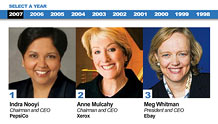Labor's most powerful womanThe Service Employees International Union's Anna Burger combines the typical combative stance towards management with a search for common ground.(Fortune) -- Anna Burger reaches into her bag, pulls out a file and offers up the numbers: 8 out of 10 Americans think corporations' profits only benefit the top earners, that companies are too focused on the short term, that their actions contribute to driving down wages. Burger is the most powerful woman in the labor movement, and her union -- the Service Employees International Union, or SEIU -- sponsored this latest public opinion poll. 
Interactive graphic
In honor of the 10th edition of Fortune's Most Powerful Women list, we're looking back at who made the top 3 each year.
See them all True, the survey questions are loaded, almost along the lines of, "Do you think marauding profiteers are good for America?" And the conclusions provide an unsurprising feed to labor's long-running anti-management storyline. Moreover, these latest poll numbers are tempered by opinion polls showing that labor's Democratic allies now running Congress are equally unpopular. But what's striking is that Burger, the union's secretary-treasurer, is here at all. We are sitting on a patio outside a Ritz Carleton conference room in Dana Point, California, where some of the most important women in corporate America have gathered for Fortune's annual Most Powerful Women's Summit. "This not the normal way I spend my Monday's and Tuesday's," laughs Burger, a willowy woman with cropped blonde hair and piercing blue eyes. Indeed, Burger -- who started her labor-organizing career as a social worker in Pennsylvania -- spends most of her time with nurses and janitors and the maids who clean the Ritz and other posh hotels, at least when she's not being courted by Democratic presidential candidates eager for SEIU's support. (The union, which is the fastest growing in the nation, recently disappointed those same candidates when it decided to put off until next week a decision about endorsing a candidate in the Democratic primary race.) That Burger was eager to join this business-minded gathering highlights a new and evolving two-pronged approach among some U.S. labor leaders, who now combine the typical combative stance toward management, especially at nonunion shops, with a search for common ground. Two years ago, SEIU President Andy Stern was leading a protest campaign against nonunion Wal-mart (Charts, Fortune 500), and the activist group he helped launch still complains about the behemoth box store. But earlier this year SEIU and Wal-mart joined together in a call for national healthcare reform. Likewise, Stern recently joined with the Washington CEO group, the Business Roundtable, on healthcare. "We really do want to figure out how to build new opportunities and partnerships [in order] to share the prosperity of this country," says Burger, who heads up Change to Win, a powerful political alliance of seven unions, representing six million workers, that is sure to throw its considerable activist and financial weight around in the '08 election. But at the Fortune gathering, Burger couldn't help but notice continued huge gaps between the thinking of labor and management. While the women CEO's at the summit talked about their responsibility to shareholders, she said, they usually left out workers and communities. And while executives swapped advice on reducing healthcare costs through company wellness programs and better information technology, Burger argued that Congress needs to take action to cover 47 million uninsured Americans, a level of government market intervention that makes plenty of executives nervous. And after hearing a session on DNA mapping, she is taking the idea to union locals, noting that it's a health benefit that shouldn't be confined to the well-off. (She adds that DNA researchers would benefit from a more diverse pool of clients.) But on a personal level, Burger will always have one enduring bond with her corporate female peers. Like the upper echelons of corporate America, labor was always a man's world. Her father was a Teamster, and she was the first female president of her SEIU local in Pennsylvania, a state dominated by male-oriented industrial unions. She recalls that when she was the only woman in the room -- which was always -- she would plant herself at the head of the table so that she couldn't be ignored. Then she would insert her opinions. "I figured out where to air differences and where to find common ground," she says. |
Sponsors
|

